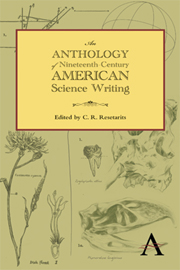Book contents
- Frontmatter
- Contents
- Preface
- Part One 1800–1846 Naturals and Naturalists
- Part Two 1846–1876 Warriors
- Part Two Introduction
- “On the Fossil Horses of America,” Proceedings of the Academy of Natural Sciences of Philadelphia (1847)
- “A Flora and Fauna Within Living Animals” (excerpt), Smithsonian Contributions to Knowledge (1853)
- “Examination of the Radiations of Red-Hot Bodies. The Production of Light by Heat” (excerpt), American Journal of Science and Arts (1847)
- “Section IX: Range of the Geographical Distribution of Animals,” Essay on Classification (1857)
- “On the Origin of Species” (excerpt), American Journal of Science (1860)
- “Darwin on the Origin of Species,” Atlantic Monthly (1860)
- “Sequoia and Its History” (excerpt), American Naturalist (1872)
- “On the Origin of the Geographical Distribution of Crustacea” (excerpt), Annals and Magazine of Natural History (1856)
- “On Cephalization” (excerpt), New Englander (1863)
- “On some Results of the Earth's Contraction from cooling, including a discussion of the Origin of Mountains, and the nature of the Earth's Interior” (excerpt), American Journal of Science (1873)
- “On Comets and Meteors,” Proceedings of the American Philosophical Society (1869)
- “Linear Associative Algebra,” A Memoir read before the National Academy of Sciences in Washington, 1870 (excerpt), American Journal of Mathematics (1881)
- “The Laws of Organic Development” (excerpt), American Naturalist (1871)
- “Fossil Horses in America,” American Naturalist (1874)
- “Odontornithes, or Birds with Teeth,” American Naturalist (1875)
- “The Genesis of Species” (excerpt), North American Review (1871)
- Part Three 1876–1900 Scientists
- Bibliography
“Darwin on the Origin of Species,” Atlantic Monthly (1860)
from Part Two - 1846–1876 Warriors
Published online by Cambridge University Press: 05 June 2012
- Frontmatter
- Contents
- Preface
- Part One 1800–1846 Naturals and Naturalists
- Part Two 1846–1876 Warriors
- Part Two Introduction
- “On the Fossil Horses of America,” Proceedings of the Academy of Natural Sciences of Philadelphia (1847)
- “A Flora and Fauna Within Living Animals” (excerpt), Smithsonian Contributions to Knowledge (1853)
- “Examination of the Radiations of Red-Hot Bodies. The Production of Light by Heat” (excerpt), American Journal of Science and Arts (1847)
- “Section IX: Range of the Geographical Distribution of Animals,” Essay on Classification (1857)
- “On the Origin of Species” (excerpt), American Journal of Science (1860)
- “Darwin on the Origin of Species,” Atlantic Monthly (1860)
- “Sequoia and Its History” (excerpt), American Naturalist (1872)
- “On the Origin of the Geographical Distribution of Crustacea” (excerpt), Annals and Magazine of Natural History (1856)
- “On Cephalization” (excerpt), New Englander (1863)
- “On some Results of the Earth's Contraction from cooling, including a discussion of the Origin of Mountains, and the nature of the Earth's Interior” (excerpt), American Journal of Science (1873)
- “On Comets and Meteors,” Proceedings of the American Philosophical Society (1869)
- “Linear Associative Algebra,” A Memoir read before the National Academy of Sciences in Washington, 1870 (excerpt), American Journal of Mathematics (1881)
- “The Laws of Organic Development” (excerpt), American Naturalist (1871)
- “Fossil Horses in America,” American Naturalist (1874)
- “Odontornithes, or Birds with Teeth,” American Naturalist (1875)
- “The Genesis of Species” (excerpt), North American Review (1871)
- Part Three 1876–1900 Scientists
- Bibliography
Summary
Novelties are enticing to most people: to us they are simply annoying. We cling to a long-accepted theory, just as we cling to an old suit of clothes. A new theory, like a new pair of breeches (“The Atlantic” still affects the older type of nether garment) is sure to have hard-fitting places; or even when no particular fault can be found with the article, it oppresses with a sense of general discomfort. New notions and new styles worry us, till we get well used to them, which is only by slow degrees.
Wherefore, in Galileo's time, we might have helped to proscribe, or to burn – had he been stubborn enough to warrant cremation – even the great pioneer of inductive research; although, when we had fairly recovered our composure, and had leisurely excogitated the matter, we might have come to conclude that the new doctrine was better than the old one, after all, at least for those who had nothing to unlearn.
Such being our habitual state of mind, it may well be believed that the perusal of the new book “On the Origin of Species by Means of Natural Selection” left an uncomfortable impression, in spite of its plausible and winning ways. We were not wholly unprepared for it, as many of our contemporaries seem to have been. The scientific reading in which we indulge as a relaxation from severer studies had raised dim forebodings.
- Type
- Chapter
- Information
- An Anthology of Nineteenth-Century American Science Writing , pp. 125 - 134Publisher: Anthem PressPrint publication year: 2012



